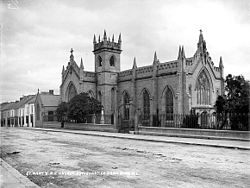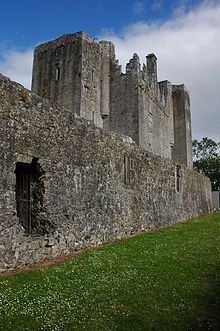- De Barry family
-
The de Barry family (Irish: de Barra) is an ancient family of Cambro-Norman origins which once had extensive land holdings in Wales and County Cork, Ireland. The founder of the family was a knight who assited in the Norman Conquest of England and Wales during the 11th century. As compensation for his services, the ancestor of the family, Odo de Barri, was awarded lands in south Wales including the island of Barri in the Severn estuary near Cardiff. The family name derives from the Norman-French "de Barri" (of Barri). In the following decades, many family members assisted in the Norman invasion of Ireland. For their services, King John of England awarded them extensive baronies in the Kingdom of South Munster, specifically the defunct Uí Liatháin kingdom (O'Lethan and Imokilly) with its late seat at Castlelyons.
Contents
Ancestry
Odo de Barry was the grantee of the immense manor of Manorbier in Pembrokeshire, which included the manors of Jameston and Manorbier Newton, as well as the manors of Begelly and Penally. He built the first motte-and-bailey at Manorbier. His son, William FitzOdo de Barry, is the common ancestor of the Barry family in Ireland. He rebuilt Manorbier Castle in stone and the family retained the lordship of Manorbier until the 15th century.
Ancestors of De Barry family Odo de Barry William FitzOdo de Barry Philip de Barry Otho Walter FitzOtho Gerald de Windsor Gwladys ferch Ryall Angharad de Windsor Rhys ap Tewdwr Nest ferch Rhys Rhiwallon ap Cynfyn Gwladys ferch Rhiwallon Issue of William FitzOdo de Barry
He had sons: Robert, Philip, Walter and Gerald (better known as Giraldus Cambrensis) by Angharad (also known as Hangharad) daughter of Gerald de Windsor (died 1135) and Nest ferch Rhys (died after 1136). After Gerald's death, Nest's sons married her to Stephen, her husband's constable of Cardigan Castle, by whom she had another two sons; the eldest was Robert Fitz-Stephen.
- Robert de Barry accompanied his half-uncle Robert Fitz-Stephen in the Norman invasion of Ireland. He took part in the Siege of Wexford and was killed at the battle of Lismore in 1185.
- Philip de Barry came to Ireland in 1185 to assist his half-uncle Robert Fitz-Stephen, and his first cousin Raymond FitzGerald (also known as Raymond Le Gros), in their efforts to recover lands in the modern county Cork - the cantreds of Killede, Olethan and Muscarydonegan. These cantreds or baronies had been expropriated by another (half) first cousin, Ralph Fitz-Stephen (died 1182), the grandson of Nesta by Stephen, Constable of Cardigan. Robert Fitz-Stephen eventually ceded these territories to Philip de Barry, his half-nephew. On 24 February 1206, King John I of England confirmed William de Barry, Philip's son, in the possession of these territories and, by letters patent, conferred on him the Lordships of Castlelyons, Buttevant and Barry's Court in East Cork [1]. The family would eventually acquire the honours of Viscount Buttevant and Earl of Barrymore.
Barryscourt Castle was the seat of the Barry family from the 12th to the 17th centuries.
The name of the town of Buttevant, County Cork, is believed to derive from the war cry of the De Barry family: "Boutez-en-Avant", roughly translating as "Kick your way through". The British Military Establishment, Buttevant 1815-1922
The British Military Establishment, Buttevant 1815-1922
 Buttevant Castle c. 1880
Buttevant Castle c. 1880
Irish descendants
The most prominent Gaelic neighbours of the de Barrys were the MacCarthy Reagh dynasty, rulers of the principality or petty kingdom of Carbery. For the most part, with not a great many exceptions, the two families kept on good terms, and also regularly intermarried. The de Barrys are descended from several of the MacCarthy Reagh princes through their daughters.[1] Likewise the Barrys intermarried with the also powerful MacCarthys of Muskerry.[2]
Some Barrys eventually became so Gaelicized that a paternal Gaelic lineage was found for them. They were made to descend from Fothach Canann,[3] 5th son of the famous Lugaid Mac Con of the Dáirine or Corcu Loígde.
Uí Liatháin
The Uí Liatháin or "Sons of Liathán", whose long decayed and essentially defunct kingdom the de Barrys by total coincidence came to occupy, are famous for having raided Britain in ancient times from their fortresses in Wales and Cornwall. Notable is the fact that the de Barry family descend maternally, through Angharad and Nesta, from the ancient Welsh Prince Cunedda, whose sons were the very Britons who ended the Uí Liatháin's dominance in Wales.
See also
References
- Barry, E., Barrymore: Records of the Barrys of County Cork. Cork: Guy and Co. Ltd. 1902. (Reprinted from the Journal of the Cork Historical and Archaeological Society)
- Barry Family Name Origins
Categories:- Families
- Anglo-Norman families
- People from Pembrokeshire
- De Barry family
Wikimedia Foundation. 2010.


